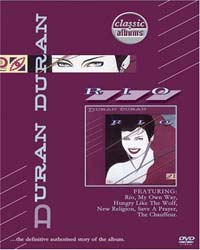Back when we had Dish TV with VH-1 Classic, I got hooked on Classic Albums because I’m a sucker to hear the story behind the creation of certain landmark albums. Even if I didn’t like the artists, the program still left me enlightened with a greater understanding and respect about the music from the particular title. Many changed my mind (Transformer by Lou Reed, Face Value by Phil Collins) or strengthened my appreciation (A Night at the Opera by Queen). These one-hour episodes are a must for music/trivia geeks like myself because they focus on what went into making the record, not the crash and burn anecdotes which fill Behind the Music.
This Fall the producers finally got around to covering an album that was truly an influential part of my life, Duran Duran’s Rio. When the record appeared, I was 14 going on 15 and my family had recently moved to Houston which had “ruined” how I had everything “planned out” high school if we remained in Springfield. Shortly after we got initially settled, we started getting cable TV again and it had this weird channel I heard about from classmates, MTV. Back in 1982, it showed videos of tunes I never would’ve heard back in Springfield, namely this one called “Hungry like the Wolf.” Raiders of the Lost Ark-visuals aside, the song was impressive and I was intrigued to hear more. Luckily, another guy at Strake had it and he generously loaned it to me. Upon the first listen, it was definitely an “all killer, no filler” album. More importantly, I really identified with several tracks: “My Own Way,” “Hold Back the Rain,” and “New Religion.” Overdramatic I know, yet it wasn’t in the mind of a teenager experiencing that nobody understands me phase. Through this (American) breakthrough record, Duran Duran became one of the instrumental artists that reshaped my musical tastes from the liking the standard Midwestern fare of Hair Metal and Arena Rock (because nothing else came to Springfield) to all the New Wave stuff coming out of the UK, Australia, New York and Los Angeles.
The story begins with what life was like in England as the Eighties began. Things were pretty rotten: the economy (sounds familiar), ethnic riots, a controversial leader (Thatcher) and eventually the Falkland Islands conflict (the distraction to re-elect the Tories). Punk rock had burned out but left its imprint on the next generation of aspiring musicians, including founding members John Taylor and Nick Rhodes. In the process of making a viable band, other people join/leave until Duran Duran solidified into the line-up most people remember during their heyday. The narrative does jump around on how Rio evolved by contrasting with their self-titled debut, the tours leading up to its release and their two-way relationship in making MTV influential. Each member, except Andy, is interviewed individually about what he remembered on a song’s origin, how crazy it was spending a week in Sri Lanka shooting three videos at once and any other relevant story. It would’ve been nice to have Andy’s input though but in their defense, the other four members only say nice things about him. Outside the band, the producers interviewed Duran Duran’s first manager, various EMI people, David Kershenbaum (he remixed Rio to make it “work” for the US market), a British reporter who covered them during their early years, a founder of MTV and (oddly) Bob Geldof.
As a fan of theirs for over two decades, the DVD was worth the 13 bucks. I feel non-fans would be entertained from one viewing too, especially if were around my age in the Eighties. The most surprising part which made me happy was seeing Roger smiling and engaging the interviewer. In the past, he was always so shy and serious looking. It was no surprise when he was the first to quit in 1986. Roger even refused to be interviewed on Behind the Music for the Duran Duran episode back in the Nineties.
Overall, the disc is a fitting tribute to Duran Duran’s 30th anniversary this year and what would be the album’s 25th. It was originally released in mid 1982 but radio finally picked up on the hits around early 1983. How I remember hearing the string of awesome singles all Spring until they had the (still) disappointing Seven and the Ragged Tiger completed for Fall.

